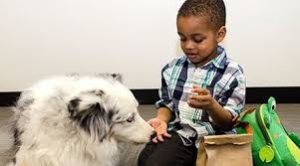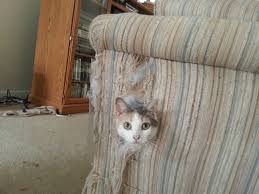 Back to school season is a time of transition for the whole family as parents and children begin to adjust to a new routine. But it is also a difficult time for pets. After an entire summer of enjoying extended family time, leaving your pet at home alone for the entire day can be upsetting.
Back to school season is a time of transition for the whole family as parents and children begin to adjust to a new routine. But it is also a difficult time for pets. After an entire summer of enjoying extended family time, leaving your pet at home alone for the entire day can be upsetting.
Cats and dogs are vulnerable to changes in routine. They thrive on mental and physical stimulation. With no company and nothing to do during the day, pets are prone to developing depression and anxiety.

 Dogs are particularly at risk during the back to school season for developing separation anxiety, a disorder characterized by digging and scratching in an attempt to escape, excessive howling and whining, destructive chewing, a lapse in potty training and overall just a change in mood. Major disruption to the family routine is a potential trigger for this disorder.
Dogs are particularly at risk during the back to school season for developing separation anxiety, a disorder characterized by digging and scratching in an attempt to escape, excessive howling and whining, destructive chewing, a lapse in potty training and overall just a change in mood. Major disruption to the family routine is a potential trigger for this disorder.
Healthy, well-adjusted cats are less prone to separation anxiety under these circumstances. However, at-risk cats, which include those with a history of abandonment, trauma, abuse, or being passed between multiple owners, are vulnerable to this disorder. Cats or kittens that have an especially strong bond with your child may also be at risk once their favorite person disappears for hours at a time. In cats, separation anxiety often looks like trembling, withdrawing, hiding and trying to escape, loss of appetite, change in mood, and an upset stomach resulting in diarrhea.
The best way to help your pet adjust to the new family schedule is to avoid any abrupt changes. Ease your pet into the new schedule by gradually introducing your dog or cat to short absences to get your pet comfortable with the idea of you leaving. After they relax a little, gradually lengthen these absences during the weeks leading up to the new schedule. Pets, especially dogs, tend to take their emotional cues from their pet parents, so it’s important to stay calm and not to make a big deal about leaving or saying goodbye. If you’re concerned about destructive behavior or house soiling, you might also want to consider crate training. Again, this is something that should be eased into gradually, giving your pet plenty of time to acclimate to the idea.

 If you return home to find your pet has engaged in bad behavior, be patient. Scolding or punishing your pet for bad behavior could make things worse. Instead, set your pet up for success by limiting access to tempting items while you are gone, tiring them out before you go with a long walk or play session and providing them with toys. You can also hire a pet care company like Passionately Pets to walk your dog or play with your cat midday while you are at work.
If you return home to find your pet has engaged in bad behavior, be patient. Scolding or punishing your pet for bad behavior could make things worse. Instead, set your pet up for success by limiting access to tempting items while you are gone, tiring them out before you go with a long walk or play session and providing them with toys. You can also hire a pet care company like Passionately Pets to walk your dog or play with your cat midday while you are at work.
Once the family is back together in the evenings, be sure to shower attention on your pets to reassure them that they’re not forgotten. It’s also important to provide them with plenty of exercise, which will also help them stay calm and relaxed during the day.
If you try these tips and your pet still shows signs of anxiety or depression once the new schedule starts, talk to your veterinarian.
Hopefully, by being mindful of your pet’s emotional state while preparing for the school year, the entire family will transition smoothly into the new schedule along with your four-legged family members included.
Has your pet’s behavior changed when school started up again? Tell us about it in the comments.





Leave a Reply